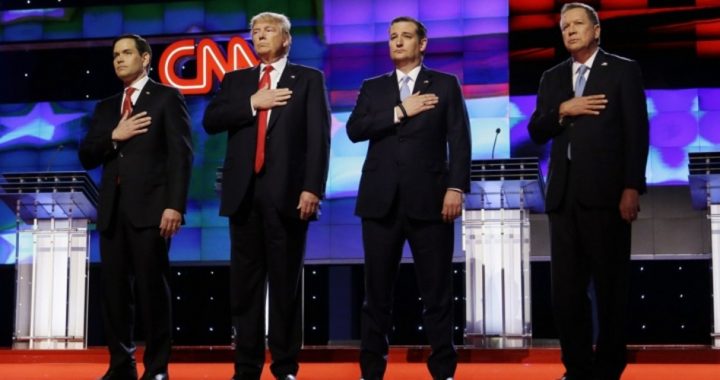
During the Republican presidential debate at the University of Miami in Coral Gables, Florida, on March 10, the candidates were more civil than in the previous debate and spoke more about matters of substance. Prompted by debate moderator Jake Tapper, who said he wanted to start the evening by talking about jobs and the economy, a key point of discussion was “trade deals.” Tapper noted, “There have been some real differences expressed … on this stage on whether trade deals have been good for the American workers. One of Mr. Trump’s … signature issues is ending what he calls ‘disastrous trade deals’ in order to bring jobs back to America.”
Tapper kicked off the discussion by calling on each of the candidates in turn. First was Ohio Governor John Kasich, whom Tapper told,
You’ve been a strong advocate for these trade deals over the years. Critics say these deals are great for corporate America’s bottom line, but have cost the U.S. at least 1 million jobs. How do you respond to the criticism that you’ve been catering to board rooms at the expense of the American middle class?
Kasich answered, in part:
One out of five Americans works in a job connected to trade; 38 million Americans are connected to it.
But my position has always been we want to have free trade, but fair trade. And I’ve been arguing all along that it is absolutely critical that when other countries break those agreements, we don’t turn the process over to some international bureaucrat who comes back a couple years later and says, “Oh, America was right,” and people are out of work.
The fact of the matter is we have to have an expedited process. When people cheat, when countries cheat and they take advantage of us, we need to blow the whistle. And as president of the United States, I absolutely will blow the whistle and begin to stand up for the American worker.
But we don’t want to lock the doors and pull down the blinds and leave the world. Because frankly, if we do that, prices will go up. People will buy less. Other people will be out of work. And we don’t want to see that happen.
Trade, though, has to be balanced and we have to make sure that when we see a violation, like some country dumping their products into this country, believe me as president, I will stand up and I will shut down those imports because they’re a violation of the agreement we have and the American worker expects us to stand up.
Turning to Trump, Tapper asked him to address charges that his campaign rhetoric is inconsistent with how he conducts his own businesses, telling Trump, “You’ve brought in foreign workers instead of hiring Americans, and your companies manufacture clothing in China and Mexico.” When Tapper asked Trump why the voters should trust him to run the country differently than the way he runs his businesses, Trump defended his past business practices, because “the devaluations that other countries — the monetary devaluations that other countries are constantly doing and brilliantly doing against us, it’s very, very hard for our companies in this country, in our country, to compete.”
Trump also maintained that, because of his experience in dealing with such problems, he was the best candidate to change things.
Turning to Marco Rubio, Tapper quoted a statement the Florida senator made last October, when he said he was “generally very much in favor of free trade.” The moderator then asked Rubio, “If elected, will you support free trade deals even if it means the inevitable loss of U.S. jobs?”
Said Rubio:
No, I support free trade deals that are good for America. We’re 5 percent of the world’s population. If all we do is sell things to each other, we can only sell to 5 percent of the people on earth. We have to have access to the hundreds of millions of people in the world today who can afford to buy things.
The problem is we’re a low-tariff country. To import something into the United States is not very expensive, but many of these countries we can’t export to because their tariffs are too high. And so I am in favor of deals that allow us to bring down those tariffs so that America can sell things to all these people around the world.
Rubio said “there are good trade deals and there are bad ones,” and cited our trade with Colombia as an example of a good deal that has produced a surplus for the United States. In contrast, he said, “you’ve seen trade deals like in Mexico that have been less than promising in some aspects, better in others.” In summary, said Rubio:
Bottom line is I believe that America, if given access to foreign markets, our workers are the most productive in the world, our people are the most innovative on this planet. If it is a free and fair trade deal, we can compete against anyone in the world, and we need to in the 21st century.
Rubio was presumably speaking about unilateral trade agreements, not complex multinational agreements such as NAFTA or the proposed TPP. Getting into that area, Tapper then asked Senator Ted Cruz (R-Texas) about his position on Pacific trade deals:
Senator Cruz, you were a supporter of the Pacific trade deal, but after taking some heat from conservatives, you changed your position. Why should these voters who don’t like these trade deals trust that you will fight for them all the time and not just in election years?
Cruz replied, in part:
Actually that’s incorrect. There are two different agreements. There’s TPA and TPP. I opposed TPP and have always opposed TPP, which is what you asked about. And when it comes to trade, look, free trade, when we open up foreign markets, helps Americans. But we’re getting killed in international trade right now. And we’re getting killed because we have an administration that doesn’t look out for American workers and jobs are going overseas. We’re driving jobs overseas….
Number one, we need to negotiate trade deals protecting American workers first, not the corporate board room. Number two, we need to lift the regulations on American businesses here so we see jobs coming back. And number three, we need a tax plan like the tax plan I’ve introduced that will not tax exports and that will tax imports, and that will bring millions of high-paying jobs back to America.
Just to set the record straight on the difference between TPA and TPP, we quote from an article The New American posted on January 14:
Various clocks are now ticking down the days toward a final vote on the Trans-Pacific Partnership. They started ticking when the official TPP text was finally released by President Obama on November 5, 2015, after years of ultra-secret negotiations by the Bush and Obama administrations — and their privileged globalist/corporatist cronies. President Obama and his Republican TPP allies, House Speaker John Boehner and Senate Majority Leader Mitch McConnell, teamed up last year to ram “Fast Track” legislation (Trade Promotion Authority, TPA) through Congress. The purpose of TPA is to enable the globalist trade lobby to rush the massive TPP (over 5,500 pages of legalese) through Congress before there is time to study, digest, analyze, and expose it. The TPA “fast track” will now also apply to the still-brewing Transatlantic Trade and Investment Partnership (TTIP), as well as other trade agreements still in the hopper.
Put simply: The TPA is the means, while the TPP is the end. If Cruz seeks to make a distinction between the two, he is evidentially splitting hairs.
In an undated letter to a constituent in Texas some time back Cruz wrote:
Under President Obama, economic growth is anemic and job growth is stagnant. I hope the Trans-Pacific Partnership (TPP) and the Transatlantic Trade and Investment Partnership (TTIP) produce agreements that reduce government-created barriers to trade, enabling increased prosperity for all involved.
Rubio also publicly supported the TPP in an opinion piece published by the Wall Street Journal on August 28, 2015, entitled “How My Presidency Would Deal With China.” Rubio wrote:
As president, I would respond not through aggressive retaliation, which would hurt the U.S. as much as China, but by greater commitment and firmer insistence on free markets and free trade. This means immediately moving forward with the Trans-Pacific Partnership and other trade agreements.
Another moderator, Stephen Dinan of the Washington Times, addressed Rubio and referred to something else we have written about: In late 2014, Disney laid off 250 tech workers in Orlando, and not only replaced many of them with foreign workers, but required some of them to train their own replacements. Dinan noted that Rubio supports increasing the H-1B visa program that made it possible to bring in these foreign workers and asked if this program doesn’t take jobs away from Americans. Rubio responded by saying, in part,
If it’s being abused the way Disney did. Understand that program, it is illegal now under that program to use it to replace American workers. Under that program, you have to prove not only that you’re not replacing Americans, but that you’ve tried to hire Americans. And if a company is caught abusing that process, they should never be allowed to use it again.
The second problem with the current structure of the program that people perhaps don’t understand is a lot of these companies are not directly hiring employees from abroad. They are hiring a consulting company like Tata, for example, out of India. That company then hoards up all of these visas. They hire workers…. Disney or some other company hires [Tata ]….
It is illegal now, it is a violation of the law now to use that program to replace Americans. And if a company is caught doing that, whether it be Disney or anyone else, they should be barred from using the program in the future.
When Trump was asked to comment on the H-1B visa program he said, in part:
I know the H1B very well. And it’s something that I frankly use and I shouldn’t be allowed to use it. We shouldn’t have it. Very, very bad for workers. And second of all, I think it’s very important to say, well, I’m a businessman and I have to do what I have to do.
… It’s very bad for business.… It’s very bad for our workers and it’s unfair for our workers. And we should end it. Very importantly, the Disney workers endorsed me, as you probably read.
Further along in the debates, Trump once again brought up trade, saying, “Trade deals are absolutely killing our country. The devaluations of their currencies by China and Japan and many, many other countries, and we don’t do it because we don’t play the game. And the only way we’re going to be able to do it is we’re going to have to do taxes unless they behave.”
When asked by Tapper what is wrong with Trump’s vision of the Republican Party, Cruz responded, in part:
He’s right about the problems. But his solutions don’t work. So, for example, his solution on international trade, he proposed earlier a 45 percent tariff on foreign goods….
And the effect of a 45 percent tariff would be when you go to the store, when you go to Walmart, when you are shopping for your kids, the prices you pay go up 45 percent. But not only that, when you put those in place, because a tariff is a tax on you, the American people, but the response of that is that the countries we trade with put in their own tariffs.
A much better solution that works is the tax plan I’ve laid out which would enable our exports to be tax-free, would tax our imports, would not raise prices for Americans, and would not result in reciprocal tariffs. Fix the problem and that’s what’s missing from what Donald says.
Invited to respond to Cruz’s comments, Trump said, in part:
The 45 percent is a threat that if they don’t behave, if they don’t follow the rules and regulations so that we can have it equal on both sides, we will tax you. It doesn’t have to be 45, it could be less. But it has to be something because our country and our trade and our deals and most importantly our jobs are going to hell.
Invited to respond, Cruz said (again in part):
Donald just said … that that 45 percent tax is a threat….
How is this helping you? If your wages have been stagnant for 20 years; if you can’t pay the bills, how does it help you to have a president come and say, “I’m … going to put a 45 percent tax on diapers when you buy diapers, on automobiles when you buy automobiles, on clothing when you buy clothing.” That hurts you….
Trump responded, in part:
What will happen if they don’t behave, we will put on a tax of some amount, and it could be a large amount, and we will start building those factories and those plants. Instead of in China, we’ll build them here. And people will buy products from here, rather than buying it through China where we’re being ripped off. And we have a $505 billion trade deficit right now.
So we’ll build our factories here and we’ll make our own products. And that’s the way it should be done.
This debate included discussions on several other important topics, including each candidate’s ideas on how to save Social Security.
Rubio proposed gradually advancing the retirement age for full Social Security benefits, stating, “someone my age would retire at 68. We would continue to allow it to increase the retirement age for future generations until it hit 70. And so my children would retire at 70.”
Trump said, “It’s my absolute intention to leave Social Security the way it is. Not increase the age and to leave it as is.” To accomplish this, he proposed cutting costs elsewhere: “We’re going to get rid of waste, fraud, abuse, and bring back business.”
When moderator Dana Bash questioned this idea, citing figures from the Committee For a Responsible Federal Budget indicating that cuts such as Trump proposed would save only about $3 billion, out of the $150 billion necessary to make Social Security solvent, she asked: “So how would you find that other $147 billion?”
Trump proposed making up the shortfall by cutting the budget in other areas, including the cost of stationing so many of our troops overseas in places like South Korea, Germany, and Japan, suggesting that those countries should pay us for defending them.
When asked to comment on whether he though those cuts would save Social Security, Rubio said “the numbers don’t add up,” and that changes to the program such as he suggested would be necessary.
When asked to present his plan, Cruz said, in part:
For seniors, for anyone at or near retirement, there will be no changes whatsoever. Every benefit will be protected to the letter. But for younger workers, we need to change the rate of growth of benefits so it matches inflation instead of exceeding inflation. And as you noted Dinan, we need to have for younger workers, that a portion of your tax payments are in personal accounts, like the 401(k), that you own, that you control, that you can pass on to your kids and grandkids.
When asked to present his plan, Kasich advocated reducing Social Security benefits for those who are wealthy, and paying full benefits to those who do not have substantial assets or other income.
I have a plan to fix it that doesn’t even require raising the retirement age.
If you’ve had wealth throughout your lifetime, when the time comes to be on Social Security, you’ll still get it. It will just simply be less. And for those people who depend on that Social Security, they’ll get their full benefit. That’s the way it will work. And we don’t have to monkey around with the retirement age. And how do I know that? I’ve done all this before.
This debate did address more substantive issues than many previous such meetings, and with less acrimony and name calling. As the candidates get down to the wire with the important Florida and Ohio primaries coming up next week, they seem to have become more zealous about maintaining more presidential public images.
Photo: AP Images
Related articles:
TPP Power Grab: World Bank, Goldman Sachs, CFR
CFR Globalists Outline Strategy for “North American Community”
Rubio and Cruz Put Trump on Defense in Sometimes Raucous Debate
In Trump-less GOP Debate, Rubio and Cruz Receive Lion’s Share of Time
Trump Will Skip Next Fox News Debate, Says He Knows “When to Walk Away”
Rand Paul Accuses Jeb Bush of “Hypocrisy” for Marijuana Stand
Trump Will Skip Next Fox News Debate, Says He Knows “When to Walk Away”
Scaled-down Sixth Republican Debate Produces More Heat, Little Light
Denied Spot in Main Debate, Rand Paul Opts Out of “Undercard” Event
Underdogs Get Licks In During Fifth Republican Debate
Fourth Republican Debate: Feisty, Hilarious, Little Change in Polls
Leftist Bias (and Republican Stupidity) Exposed in Last Wednesday’s Debate
Republican Debate: Rubio, Cruz, Trump Rocked; CNBC Got Mocked



